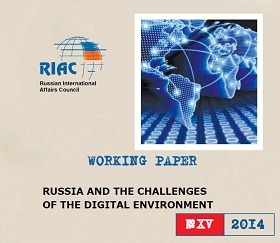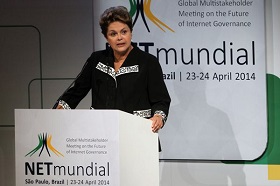Why Global Internet Governance Matters
In
Login if you are already registered
(no votes) |
(0 votes) |
Research Fellow at the French Institute of International Relations (IFRI)
Internet governance is now one of the most lively and important topics in international relations. The issue has long been ignored and restricted to small silos of experts. However, the leaks disclosed by Edward Snowden triggered a massive response to the historical “stewardship” of the Internet by the United States.
Internet governance is now one of the most lively and important topics in international relations. The issue has long been ignored and restricted to small silos of experts. However, the leaks disclosed by Edward Snowden triggered a massive response to the historical “stewardship” of the Internet by the United States.
The stakes are high: today 2.5 billion people are connected to the web, and by 2030, the Internet is likely to represent 20% of the world’s GDP [1]. Beyond mere figures, Internet governance sharpens everyone’s appetite – from big corporations to governments – for the Internet has taken up such a place in our lives and touches on so many issues, such as freedom of expression to privacy, intellectual property rights, and national security.
It is worth underlining that the issue is particularly complex. For some, the governance of the Internet should respect free market rules, a deregulated vision carried by the Clinton-Gore administration in the 1990s, or remain self-regulated by techno-scientist communities as conceived of by libertarian Internet pioneers. For others, the advent of the Internet in the area of law-making implies a return to the old rules and instruments, but this would mean putting aside the mutations produced by its practices, most importantly the expansion of expression and participation. For others, again, the ultimate legitimization would consist in adopting a Constitution or a Treaty of the Internet which would elevate its governance to the global level.
De-Westernizing the Internet
Today 2.5 billion people are connected to the web, and by 2030, the Internet is likely to represent 20% of the world’s GDP.
A number of countries have criticized American “hegemony” over the Internet (infrastructure, “critical resources” such as protocols, the domain names system, normative influence, etc.). To a large extent, the Internet is the ambivalent product of American culture and the expression of its universalist and expansionist ideology. As U.S. policymakers emphasized the importance of winning the battle of ideas both during the Cold War and in the post-2001 period, the ability to transmit America’s soft power via communications networks has been perceived as vital. U.S. policymakers have viewed the “free flow of information” as a means to by-pass authoritarian governments in order to allow America to “tell its story” directly to the people, allowing targeted populations to understand that U.S. foreign policy is benign and thereby wean them away from radical ideologies [2].
Consequently, in recent years, particularly since the Arab uprisings, governments around the world have become more alert to the disruptive potential of access to digital communications. Thus, the line between technical and political governance is being increasingly blurred by predominantly, but not exclusively, authoritarian governments who fear the “subversive power” of networked technologies both from a political and economic perspective.
The Internet is the ambivalent product of American culture and the expression of its universalist and expansionist ideology.
Demographic factors are also behind calls for change: over the next decade, the Internet’s centre of gravity will have moved eastwards. Already in 2012, 66% of the world’s Internet users lived in the non-Western world [3]. However, the reasons for questioning the U.S.’s supremacy also lie in these countries’ defiance of the current Internet governance system, which is accused of favoring the sole interests of the U.S.
New Diplomatic Horizons
While critical of the status quo, large emerging countries do not constitute a homogeneous block.
Back in December 2012 in Dubai, when the Treaty to revise the International Telecommunication Regulations (ITRs) was closely negotiated, some countries such as India, the Philippines and Kenya had rallied behind the U.S. The Dubai negotiations nevertheless showed that these “swing states” – countries that have not decided which vision for the future of the Internet they will support – are increasingly asserting their vision in order to get things moving. Placed under the auspices of the United Nations-led International Telecommunications Union (ITU), the Dubai meeting therefore served as a powerful tribune to both contest American preeminence and call for multilateral Internet governance – in other words, replacing the discussions within a traditional inter-state framework. It is precisely this standstill that crystallizes and feeds grievances and claims put forward by many of these governments. Thus, they regularly contest the key international role of various norms and standardization structures, under the hands, they believe, of the U.S. government, on the top of which they rank ICANN. Critics of ICANN argue that the Californian-based corporation is a centralized, monopolistic, and unaccountable private organization that exercises public authority and power. However, its current head has made clear that ICANN is about to expand internationally, with new offices in Singapore, Istanbul, and soon Geneva [4].
On the national level, the claim that states have sovereign power over the management of the Internet; and on the international level, the preeminence of states over other actors/stakeholders, and the notion of intergovernmental cooperation to debate Internet governance.
More fundamentally, these above-mentioned tensions reflect another conception of the Internet, which lays on a double foundation: on the national level, the claim that states have sovereign power over the management of the Internet; and on the international level, the preeminence of states over other actors/stakeholders, and the notion of intergovernmental cooperation to debate Internet governance. To this end, the arguments developed fit into a geostrategic context which has been reshaped by the emergence of new poles of influence [5]. They are aimed at making the Internet an instrument of both the domestic and foreign policies of one country. The preservation of state order, the fight against cybercrime, and the defense of commercial interests are several illustrations of elements that can be used to justify and advance the questioning of the current system. In 2011, China, Russia, Tajikistan and Uzbekistan advocated an “International code of conduct” at the U.N. that emphasized the primacy of the political authority of states over public interest-related matters on the Internet. As for the IBSA, which brings together India, Brazil and South Africa, this informal group pushed for the creation of a U.N. committee on Internet-related policies that would assume the responsibility for the operational functioning of the network.
Russia has put forward several initiatives at the U.N. over the last fifteen years – all of which have built upon a firm opposition to the U.S. and have defended a neo-Hobbesian vision.
China, given its demographic, economic and technological weight, is emblematic of the current “game”. The Chinese authorities have implemented within their borders a massive content filtering system. This is a highly sophisticated system which represents a model for a number of authoritarian regimes. Overall, on the international scene, China has sought to adopt a pragmatic approach: if Beijing does not agree with the concept of the Internet Governance Forum (IGF) – the so-called “multi-stakeholder” principle will not guarantee an equal representation between the different stakeholders and regions of the world. It nevertheless integrated ICANN’s Governments Advisory Committee in 2009, and is now very active in promoting its own standards within the organizations where technical norms are negotiated, such as the Internet Engineering Task Force (IETF).
Russia, for its part, has put forward several initiatives at the U.N. over the last fifteen years – all of which have built upon a firm opposition to the U.S. and have defended a neo-Hobbesian vision in which security considerations and the legitimacy of states to ensure their digital/information sovereignty play a critical role. Moscow has thus been active within U.N. intergovernmental agencies such as ITU, and regional ones such as the Shanghai Cooperation Organization (SCO) and the BRICS forum. Clearly, to Russia, Internet governance debates no longer fit into a transatlantic framework.
And then came Snowden
The stances taken by emerging countries unsurprisingly found favorable echoes after Edward Snowden’s revelations in June 2013 about the large-scale electronic surveillance by the NSA, with the more or less tacit support of American companies seeking a world monopoly, even letting some analysts bet on “the end of the American Internet” [6].
If Russia opportunely stood out by granting asylum to Snowden, Brazil promptly expressed its dissatisfaction. President Dilma Rousseff, herself a victim of NSA wiretapping, took the lead of a virtuous crusade against the status quo: with the loss of the U.S.’s moral leadership, their stewardship over the agencies which manage the Internet is less tolerated. At the U.N. General Assembly, Rousseff somewhat aggressively criticized Washington, as such showing a will to federate emancipation towards the U.S. dependency. Brasilia then intensified its diplomatic offensive by announcing an international summit on Internet governance – called NETmundial – to take place in April 2014 in Sao Paulo [7]. In the meantime, Brazilian authorities promulgated the Marco Civil bill, a sort of Internet Constitution which guarantees freedom of expression, protection of privacy and net neutrality. Is the Brazilian stance in a post-Snowden context purely opportunistic? Interestingly, Brazil appears to be taking the middle ground between the two governance “models” that have been under discussion so far – the multi-stakeholders and the multilateral – in a context where the Europeans have stepped aside. Since the first World Summit for Information Society (WSIS) in 2005 Brasilia has been promoting free software and advancing a global Internet governance model based on its own domestic model. Rousseff's words fit into a long-term perspective, which sees in the opening of a new international scene – the Web – an opportunity to take the international lead, after the relative failures of former President Lula to position Brazil on international security issues.
Since Snowden's revelations emerged, the American reaction has particularly focused on storytelling want to fragment and “balkanize” the global Internet – a discourse largely passed on by U.S. Net giants.
The Snowden affair nevertheless was not limited to state counter-reactions. In October, 2013 the leaders of a number of organizations involved in coordinating the Internet's global technical infrastructure signed the “Montevideo Statement on the Future of Internet Cooperation” [8], in favor of a globalization of ICANN and the Internet Assigned Numbers Authority (IANA) functions – the latter being a department of ICANN overseeing global IP address allocation, root zone management in the domain name system. These organizations also set up the NETmundial gathering along with the Brazilian government. A month before the meeting, the U.S. government announced its intention to relinquish the management and coordination of web addresses through ICANN by September 2015, providing that the IANA functions do not fall into U.N.'s arms.
The world is not flat

Environment. RIAC Working Paper
Will large emerging countries manage to reshape Internet governance around their national interests? In the shift that was the last ITU's WCIT meeting in Dubai in December 2012, the excessively polarized debates between self-proclaimed partisans of an “open and free” Internet and the supporters of a governance resting on territorial sovereignty sparked off a strained discourse over a “digital Cold War” preceding an “Internet Yalta”. Since Snowden's revelations emerged, the American reaction has particularly focused on storytelling: since states around the world question the U.S. oversight over the Internet, it is because want to fragment and “balkanize” the global Internet – a discourse largely passed on by U.S. Net giants. Well, the commercial strategies of the major Internet companies themselves tend to intensify the fragmentation of online public spaces by creating distortions in Internet users' access to information and content sharing, that is to say by reducing both the openness and pluralism that have made the Internet a great social value. Here lies a powerful engine for contest, as it has been recently the case in Western Europe. Borders do reappear where they were not necessarily expected: Google, Apple or Amazon are building their own ecosystem, from which it is becoming hard to get out.
One thing is sure: tomorrow's Internet will not resemble today's. Already the power of search engines diminishes the importance of the domain names system; cloud computing, the Internet of things and the spread of mobile Internet are starting to radically transform practices and produce new complexities with regards to the Internet's outline and governance. It is also certain that the situation will remain at a dead end if the two broad and opposed conceptions of the Internet persist: a new space of freedom or a new instrument of control.
1. D. Dean, et. alii., The $4.2 Trillion Opportunity: The Internet Economy in the G-20, The Boston Consulting Group, January 2012.
2. D. McCarthy, “Open Networks and the Open Door: American Foreign Policy and the Narration of the Internet”, Foreign Policy Analysis, 2011, pp. 89-111.
3. Data collected from www.internetworldstats.com (as of 15 February 2014).
4. “The Globalization of ICANN”, Internet Technical Advisory Committee, 19 June 2014.
5. N. Choucri, Cyberpolitics in International Relations, Cambridge : MIT Press, 2012.
6. S. Kauffmann, “La fin de l’Internet americain”, Le Monde, 18 November 2013.
7. M. Mueller, B. Wagner, “Finding a Formula for Brazil: Representation and Legitimacy in Internet Governance”, Internet Policy Observatory, 15 January 2014.
8. The Statement, dated 7th October 2013, can be accessed to : https://www.icann.org/news/announcement-2013-10-07-en.
(no votes) |
(0 votes) |






